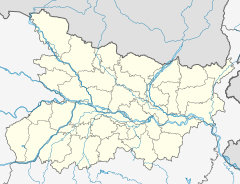Navlakha Palace
This article includes a list of general references, but it lacks sufficient corresponding inline citations. (June 2019) |
| Rajnagar Palace | |
|---|---|
 A Durga temple in the Navlakha palace campus | |
| Type | Palace |
| Location | Rajnagar, Bihar, India |
| Coordinates | 26°24′11″N 86°10′13″E / 26.40306°N 86.17028°E |
| Area | 1,500 acres (610 ha) |
| Founder | Darbhanga Raj |
| Built | 19th century |
| Demolished | 15 January 1934 |
| Architectural style(s) | Mithila Art |
| Owner | Darbhanga Maharaja |
Location in Bihar | |
Navlakha Palace, also known as Rajnagar Palace, is a royal Brahmin palace in the town of Rajnagar, near Madhubani in Bihar, India. The palace was built by Maharaja Rameshwar Singh of Darbhanga.
History
[edit]It was built by Rameshwar Singh, the younger brother of Maharajah Of Darbhanga, between 1884 and 1929 to serve as the Darbhanga Raj's administrative capital. This complex covers 1,500 acres (610 ha). It includes 11 temples to gods and goddesses and several forts and palaces. It suffered significant damage during the 1934 Bihar–Nepal earthquake and has never been rebuilt.
Architecture
[edit]Up to 22 layers of carving were used in the construction of the monument, greater than the Taj Mahal, which has a maximum of 15 layers. Its Kali temple is made of ivory and white marble that resembles the Taj Mahal. The portico has arches standing on four elephants built from cement and is allegedly one of the first cement structures in India. The oldest surviving Mithila painting is found in the Gasauni Ghar (the room where the family deity is kept) of the palace. Made in 1919 on the occasion of the Maharaja's daughter's wedding, there are very few written or photographic records of the palace.
Present condition
[edit]The palace is currently owned by the Raj Darbhanga . Following the 1934 earthquake, it was never repaired. It is continually suffering from encroachment. Locals have long demanded that it be turned into a tourist site.
See also
[edit]References
[edit]External links
[edit]- http://songs.surtall.com/raja_darbhanga_maithili_article.php
- https://www.business-standard.com/article/pti-stories/documentary-puts-spotlight-on-ruins-of-raj-darbhanga-s-famed-palace-in-bihar-119042100157_1.html
- https://www.livehindustan.com/bihar/madhubani/story-madhubani-rajnagar-raj-complex-could-not-be-buuilt-yet-1669881.html
- https://www.livehindustan.com/bihar/madhubani/story-rajnagar-raj-campus-can-not-improve-2445776.html
- http://www.catchnews.com/patna-news/biharpolls-rajnagar-home-to-the-oldest-surviving-madhubani-painting-1446630681.html


